
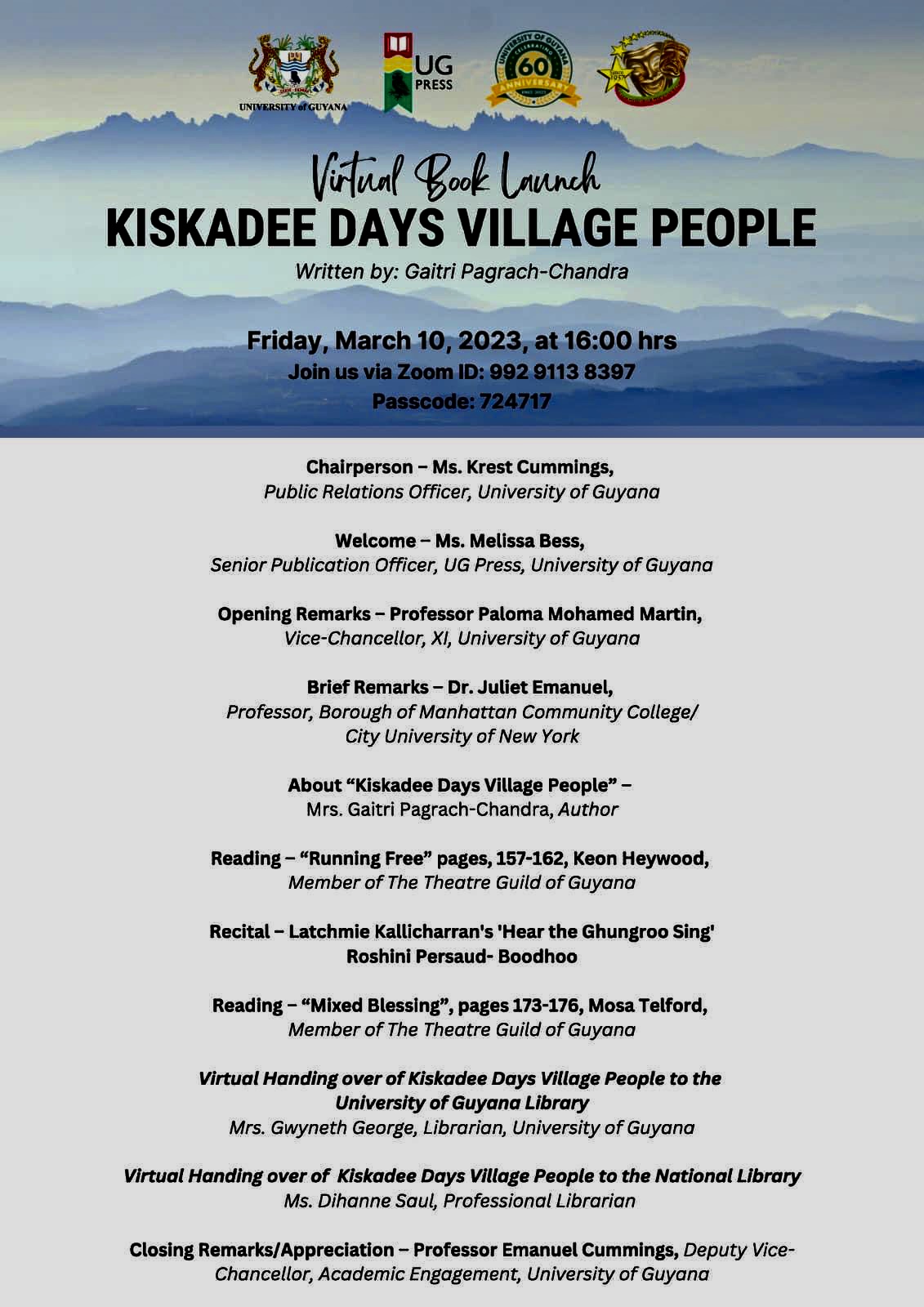


A poem in prose
by Gaitri Pagrach-Chandra
Strange men came to the starving village where the crops had once more failed.
“Come,” they told Etwaria’s grandmother. “Come with us. We will take you on a big ship across the water to a new future. A good future. You will sift sugar and earn money. Plenty money! After 5 years you can board the ship again. You will return here, a rich woman. Rich-rich! You only have to sift some sugar.”
She went with them.
There was nothing to keep her there, in that hot and dusty place. She was just another mouth to feed. They would be better off without her. With her, she took her mother’s big chalni. To sift that sugar. Plenty sugar so they would pay her plenty money. She would buy a brand new chalni for her mother when she came back.
The voyage seemed endless.
But one scorching afternoon the blue sea started to turn brown. They saw land. Full of excitement and expectation she arrived with her chalni at the plantation where she was bound. The people there laughed at her because they knew. The men had been to their starving villages too. “Sister, put away that chalni! You will not need it here. They will give you a cutlass and send you to the canefields with the rest of us.”
She sighed; she stayed; she worked.
They all did. She married a man who was kind on most days and unkind on the days he drank. Together, they raised a family. She told her grandchildren tales of worse struggles in a far-off land. A land that still tugged at her heart although her life now lay in the colony. The colony whose rich soil held her children’s and grandchildren’s navel strings.
Etwaria’s own grandchildren would come in time.
And they would go. They too would go across the water to a new future. A different water, a different future. Some would go eagerly, other reluctantly. They would learn to sift. They would sift good from bad, positive from negative, warmth from cold, hope from despair. All would feel the pull of the far-off land on the muddy shores of the Atlantic. A different land, a different pull. The call of the kiskadee would never leave them.
Text and ceramic sculpture © Gaitri Pagrach-Chandra www.kiskadeedays.com
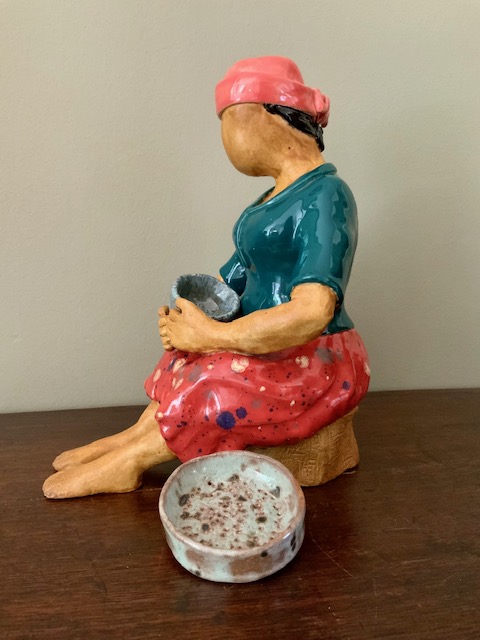
Towards the end of July I received an email congratulating me and the ladies of Kiskadee Village, and informing me that I had been awarded the 2018 Godfrey Chin Prize for Heritage Journalism. I was bowled over! When the official announcement came a few days later it said the following:
“THE GODFREY CHIN PRIZE FOR HERITAGE JOURNALISM
Ms. Gaitri Pagrach-Chandra (First Prize)
For “The Wedding” sequences in Kiskadee Days. The sequences were published weekly on Facebook from Friday May 25, 2018 to Friday, June 29, 2018.
Kiskadee Days is set in a rural Guyanese community. It is a community of ceramic sculptures created by Guyana-born, Netherlands-based, Gaitri Pagrach-Chandra. It is an innovation in Guyanese storytelling. Her sculptures, her “Ladies” – among them are Ajie, Aunty Jessie, Miss Bhagwattie Singh, Bhougie, Bibi, Claudette, Dulari, Ethel, Indrani, Jasoda, Lily-Gal, Mabel, Mavis, Miss Phoenix, Mudder Melrose, Parbati, Pearl, Sitira and Shanta. The sculptures are the vehicles through which she shares her recollections about her childhood in Guyana’s sugar belt. Starting on Friday, May 25, 2018 and ending on Friday, June 29, her ladies provided an authentic, informative and witty examination of a Hindu wedding in Guyana. These six episodes provided an accessible exploration of a major aspect of Guyanese cultural life. It is a valuable contribution to understanding and harmony. Kiskadee Days embodies all of Godfrey’s attributes and advances all the core values GCA considers when determining awards – originality, scope, impact/influence, contribution to harmony, innovation, and creativity.”
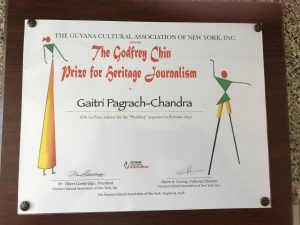
I decided to travel to New York at the end of August to receive my prize at the Guyana Cultural Association’s annual Awards evening, which was held in great style at the Brooklyn Borough Hall. It was a wonderful event, with awards, speeches, song, dance, music, food and great people. You can watch the entire ceremony via the following link https://kiskadeedays.com/2018/07/21/award-show-the-godfrey-chin-prize-for-heritage-journalism/ The Godfrey Chin Prize starts at about 50 minutes, for those who have little patience to watch it all.
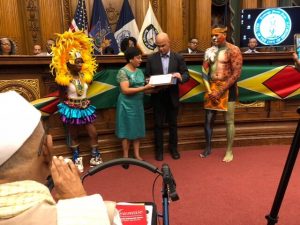
After my acceptance speech, I had a special surprise for the GCA. I had brought Sitira with me and officially presented her to the Guyana Cultural Center in New York, to be a permanent part of their collection. She will represent Kiskadee Village in New York and the Kiskadee ladies and I hope that she will bring pleasure to many. We will miss her physical presence, but she will remain with us in spirit and we hope to hear how she is faring in ‘farrin’, such a long way from her bamboo dam.
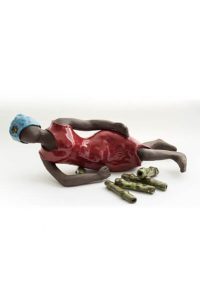
Nigel, Vishnu, Basil, Shorty and Ashraf, better known as de Bodderashun Lil Bais, were trudging home after another hard day at school. Man, Miss Rosie had eyes like a chicken-hawk. None of their pranks had gone unnoticed and they had been scolded more than once. Kicking at the grass and any stray pieces of dried mud in their path, they discussed what to do that afternoon. Basil had a good idea.
“Yuh know dat big jamoon tree near Beharry rice fiel? Well lass time ah pass, ah see dem jamoon ripin up nice.”
A short debate followed. Should they go home and drop off their school things? On the other hand, if they took the shortcut by the punt trench dam, they would soon reach the jamoon tree. Besides, they did not want anybody to beat them to it. Who knows who else had their beady eyes on those same jamoons? Energised, they set off at brisk pace. When they reached the tree, schoolbags were thrown aside on the dam, scattering books, pencils and even a marble or two, but nobody seemed to care. The tree was laden! Jamoons dotted the greenery like fat purple gems. After hasty negotiations, they agreed that Basil and Vishnu would climb and pick for all of them, throwing down jamoons for them to catch.
So Basil and Vishnu shinned up the tree, pausing only to cram a handful or two of the luscious fruit into their own eager mouths first before they started pelting down jamoons to their pals. Soon it was raining jamoons. The waiting boys caught most of them and were not bothered that a few ended up on the dam, bursting open with fat plops as they landed on the hard dried mud. They stuffed themselves. Life was good. There were so many that Nigel decided to put some in the bowl he had in his schoolbag. It had held his breaktime snack of green mango and salt and pepper.
Satiated, they stood in the shade of the tree. Shorty suddenly remarked “Y’all shirt gat jamoon juice pun it.” Then he looked down at his own. It too bore the same artistic abstract pattern of purple and mauve specks and blotches. They looked at their shirts and looked at each other.
“Oh skites!” they cried in unison. Before they could say anything else, Ashraf pointed further up the dam. Two figures were approaching. Please let it not be any of their mothers! Relief flooded them as the figures came closer. It was little Pinky, the District Commissioner’s daughter, with her nursemaid Devi, on their way to visit Devi’s Bhougie in Kiskadee Village.
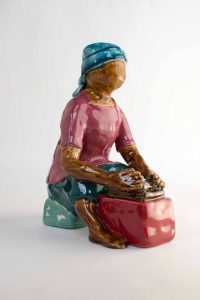
(The complete story – and many others – will appear in book form next year.)
“A wonderful fount of Guyanese creativity, of stories and images from the heart and merry ole soul of Guyana.”